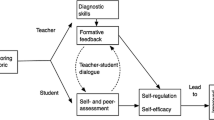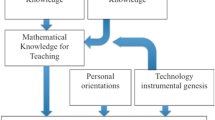Abstract
This study examined how a task-focused, year-long mathematics professional development program influenced elementary school teachers’ knowledge, beliefs, and practices. Participants completed 84 h of professional development over 13 months that were focused on exploring, modifying and implementing cognitively-demanding mathematical tasks. Using a multi-methods approach, teacher-participants completed pre- and post-measures of mathematical knowledge for teaching, teachers’ beliefs about teaching and learning mathematics, and teachers’ self-reports of enacted instructional practices. Further, three teacher-participants were randomly selected to be observed 3 times over the course of the school year. Data analyses indicated that the professional development had a statistically significant positive impact on participants’ mathematical knowledge for teaching, use of student-centered instructional practices, and beliefs towards mathematics as a subject area. Further, the observed teachers enacted some high-level mathematical tasks and questions, but these were more visible at the end of the study compared to the beginning of the study. Implications for future work are also shared.
Similar content being viewed by others
References
Alexander, P. A., & Murphy, P. K. (1998). The research base for APA’s learner-centered psychological principles. In N. M. Lambert & B. L. McCombs (Eds.), Issues in school reform: A sampler of psychological perspectives on learner-centered schools (pp. 33–60). Washington, DC: American Psychological Association.
APA Work Group of the Board of Educational Affairs. (1997). Learner-centered psychological principles: A framework for school reform and redesign. Washington, DC: Author.
Ball, D. L., Lubienski, S. T., & Mewborn, D. S. (2001). Research on teaching mathematics: The unsolved problem of teachers’ mathematical knowledge. In V. Richardson (Ed.), Handbook of research on teaching (4th ed., pp. 433–456). Washington, DC: American Educational Research Association.
Banilower, E. R., Boyd, S. E., Pasley, J. D., & Weiss, I. R. (2006). Lessons from a decade of mathematics and science reform: Capstone report for the local systemic change through teacher enhancement initiative. Chapel Hill, NC: Horizon Research, Inc.
Bell, C. A., Wilson, S. M., Higgins, T., & McCoach, D. B. (2010). Measuring the effects of professional development on teacher knowledge: The case of developing mathematical ideas. Journal for Research in Mathematics Education, 41(5), 479–512.
Carpenter, T., Fennema, E., & Franke, M. L. (1996). Cognitively guided instruction: A knowledge base for reform in primary mathematics instruction. The Elementary School Journal, 97(1), 3–20.
Carpenter, T. P., Fennema, E., Peterson, P. L., Chiang, C. P., & Loef, M. (1989). Using knowledge of children's mathematics thinking in classroom teaching: An experimental study. American Educational Research Journal, 26, 499–531.
Darling-Hammond, L., Wei, R. C., Andree, A., Richardson, N., & Orphanos, S. (2009). Professional learning in the learning profession: A status report on teacher professional development in the United States and abroad. Washington, DC: National Staff Development Council.
Desimone, L. M., Porter, A. C., Garet, M. S., Yoon, K. S., & Birman, B. F. (2002). Effects of professional development on teachers’ instruction: Results from a three-year longitudinal study. Educational Evaluation and Policy Analysis, 24(3), 81–112.
Drake, C., & Sherin, M. G. (2006). Practicing change: Curriculum adaptation and teacher narrative in the context of mathematics education reform. Curriculum Inquiry, 36(2), 153–187.
DuFour, R., & Eaker, R. (1998). Professional learning communities at work: Best practices for enhancing student achievement. Bloomington, IN: National Educational Service; Alexandria, VA: Association of Supervision and Curriculum Development.
Fennema, L., Carpenter, T., Franke, M., Levi, M., Jacobs, V., & Empson, S. (1996). A longitudinal study of learning to use children’s thinking in mathematics instruction. Journal for Research in Mathematics Education, 27(4), 403–434.
Fishman, B. J., Marx, R. W., Best, S., & Tal, R. T. (2003). Linking teachers and student learning to improve professional development in systemic reform. Teaching and Teacher Education, 19(6), 643–658.
Garet, M., Porter, A., Desimone, L., Briman, B., & Yoon, K. (2001). What makes professional development effective? Analysis of a national sample of teachers. American Educational Research Journal, 38(4), 915–945.
Heck, D. J., Banilower, E. R., Weiss, I. R., & Rosenberg, S. L. (2008). Studying the effects of professional development: The case of the NSF’s local systemic change through teacher enhancement initiative. Journal for Research in Mathematics Education, 39(2), 113–152.
Higgins, J., & Parsons, R.M. (2010). Designing a successful system-wide professional development initiative in mathematics: The New Zealand numeracy development project. Paper presented at the 2010 Annual Meeting of the American Educational Research Association: Denver, CO.
Hill, H., Rowan, B., & Ball, D. L. (2005). Effects of teachers’ mathematical knowledge for teaching on student achievement. American Educational Research Journal, 42(2), 371–406.
Hufferd-Ackles, K., Fuson, K. C., & Sherin, M. G. (2004). Describing levels and components of a math-talk learning community. Journal for Research in Mathematics Education, 35(2), 81–116.
Loucks-Horsley, S., Stiles, K. E., Mundry, S., Love, N., & Hewson, P. W. (2010). Designing professional development for teachers of science and mathematics (3rd ed.). Thousand Oaks, CA: Corwin.
McGee, J. R., Wang, C., & Polly, D. (2013). Guiding teachers in the use of a standards-based mathematics curriculum: Perceptions and subsequent instructional practices after an intensive professional development program. School Science and Mathematics, 113(1), 16–28.
National Council for Teachers of Mathematics. (2000). Principles and standards for school mathematics. Reston, VA: Author.
National Partnership for Excellence and Accountability in Teaching (NPEAT) (2000). Revisioning professional development: What learner-centered professional development looks like. Oxford, OH: NPEAT. Retrieved September 10, 2003, from http://www.nsdc.org/library/policy/npeat213.pdf.
Nye, B., Konstantopoulos, S., & Hedges, L. V. (2004). How large are teacher effects? Educational Evaluation and Policy Analysis, 26, 237–257.
Penuel, W., Fishman, B., Yamaguchi, R., & Gallagher, L. (2007). What makes professional development effective? Strategies that foster curriculum implementation. American Educational Research Journal, 44, 921–958.
Polly, D. (2006). Examining the influence of learner-centered professional development on elementary mathematics teachers’ instructional practices, espoused practices and evidence of student learning. Unpublished doctoral dissertation, University of Georgia, Athens, GA.
Polly, D. (2008). Modeling the influence of calculator use and teacher effects on first grade students’ mathematics achievement. Journal of Technology in Mathematics and Science Teaching, 27(3), 245–263.
Polly, D. (2011). Examining teachers’ enactment of technological pedagogical and content knowledge (TPACK) in their mathematics teaching after technology integration professional development. Journal of Computers in Mathematics and Science Teaching, 30(1), 37–59.
Polly, D. (2012). Supporting mathematics instruction with an expert coaching model. Mathematics Teacher Education and Development, 14(1), 78–93.
Polly, D., & Hannafin, M. J. (2010). Reexamining technology’s role in learner-centered professional development. Educational Technology Research and Development, 58(5), 557–571.
Polly, D., & Hannafin, M. J. (2011). Examining how learner-centered professional development influences teachers’ espoused and enacted practices. Journal of Educational Research, 104, 120–130.
Remillard, J. T. (2005). Examining key concepts in research on teachers’ use of mathematics curricula. Review of Educational Research, 75(2), 211–246.
Saxe, G. B., Gearhart, M., & Nasir, N. (2001). Enhancing students’ understanding of mathematics: A study of three contrasting approaches to professional support. Journal for Research in Teacher Education, 4, 55–79.
Schifter, D., Bastable, V., & Russell, S. J. (2002). Developing mathematical ideas. Parsippany, NJ: Dale Seymour.
Silver, E. A., & Stein, M. K. (1996). The QUASAR project: The “revolution of the possible” in mathematics instructional reform in urban middle schools. Urban Education, 30(4), 476–521.
Stein, M. K., Remillard, J., & Smith, M. S. (2007). How curriculum influences student learning. In F. Lester (Ed.), Second handbook of research on mathematics teaching and learning (pp. 319–370). Greenwich, CT: Information Age Publishing.
Stigler, J. W., & Hiebert, J. (1999). The teaching gap: Best ideas from the world’s teachers for improving education in the classroom. New York, NY: Free Press.
Swan, M. (2006). Designing and using research instruments to describe the beliefs and practices of mathematics teachers. Research in Education, 75, 58–70.
TERC. (2007). Investigations in number, data, and space (2nd ed.). Upper Saddle River, NJ: Pearson.
U.S. Department of Education. (2008). National mathematics advisory panel. Foundations for Success: The Final Report of the National Mathematics Advisory Panel. Washington, DC, Author.
Yoon, K. S., Duncan, T., Lee, S. W.-Y., Scarloss, B., & Shapley, K. (2007). Reviewing the evidence on how teacher professional development affects student achievement (Issues & Answers Report, REL 2007–No. 033). Washington, DC: U.S. Department of Education, Institute of Education Sciences, National Center for Education Evaluation and Regional Assistance, Regional Educational Laboratory Southwest. Retrieved December 31, 2008, from http://ies.ed.gov/ncee/edlabs.
Author information
Authors and Affiliations
Corresponding author
Rights and permissions
About this article
Cite this article
Polly, D., Neale, H. & Pugalee, D.K. How Does Ongoing Task-Focused Mathematics Professional Development Influence Elementary School Teachers’ Knowledge, Beliefs and Enacted Pedagogies?. Early Childhood Educ J 42, 1–10 (2014). https://doi.org/10.1007/s10643-013-0585-6
Published:
Issue Date:
DOI: https://doi.org/10.1007/s10643-013-0585-6




